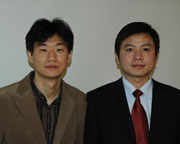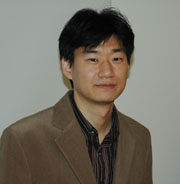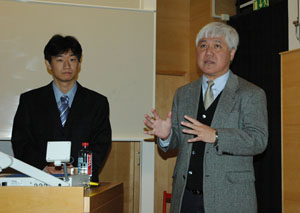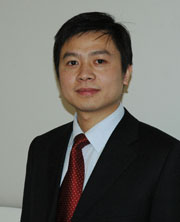Pioneering dissertations
Two promising young researchers defend their dissertations from the device technology group (EKT) at KTH ICT in February. Hyung-Seok Lee from Korea has done work on silicon carbide transistors and Zhen Zhang on nano transistors in silicon. Both dissertations are pioneering and will affect future electronic devices, and both dissertations have attracted international interest.

They are both very happy with their studies at KTH ICT and with their stay in Sweden. Both have produced important research that really is for the future – each in their separate field.
Hyung-Seok Lee is from Korea and received the B.S. and M.S. degrees in Electrical engineering from Korea University, Seoul, Korea . He came to KTH in Kista 2002 to continue his graduate studies within power transistors in silicon carbide. His professor in Korea had been working with KTH ICT and recommended Hyung-Seok to apply for the PhD position.
Zhen Zhang is from China and has a bachelor exam from University of Science and Technology and a master from Chinese Academia of Sciences. He became very interested in silicon devices on a nano scale, and realized that in order to pursue this he needed to continue his PhD abroad. He came to Kista 2003 after a chance encounter with Prof. Shi-Li Zhang.
Hyung-Seok Lee

He has been doing research on silicon carbide Power Bipolar Transistors. These devices must handle high voltage and current ratings as power switch even in high temperature, high pressure and harsh conditions with less power loss. Such devices will save energy.
- I am very happy with the results, Hyung-Seok says. This will be a very important component in the future hybrid car. Until now such power transistors have been made in silicon which can’t handle high temperatures or harsh conditions. The silicon carbide transistors will be able to do this and will much more energy efficient.
Hyung-Seok is now working at TranSiC - the company that is commercializing the component. So in the near future you will find him in Sweden with his family. But in the more distant future he will return to Korea and hopefully have a research position in industry.

Prof Carl-Mikael Zetterling has been his principal supervisor, and he is very impressed with the work.
- These High Voltage transistors will make the future hybrid cars possible, Carl-Mikael underlines. Hyung-Soek has made seven batches of this transistor in the Electrum Laboratory. This is an exceptional resultant – most university would be proud with one! This shows that the Electrum Laboratory has exceptional international class.
Hyung-Seok has been part of the research team at EKT with doc Martin Domeij and prof Mikael Östling as co-advisers. Economic support was given by the Swedish Energy agency and VINNOVA.
Zhen Zhang

His work on nano transistors in silicon has produced devices of 30 nanometer scale. The silicon MOSFET (Metal-oxide-semiconductor field effect transistor) is the main component in electronic IC chips. It works as an electronic switch which is controlled by the gate electrode. To achieve higher integration level and higher speed of the IC chips, the MOSFET has to be scaled down constantly. As device gets smaller the gate gets increasingly difficult to control the MOSFET switch. So instead of having one gate in each MOSFET, researchers are introducing multiple gates in a single device to guarantee the ultimate scaling.
- I have developed the process for fabricating the so called FinFET devices with a tri-gate MOSFET structure. With the available technology we achieved a device of 30 nanometers. We are actually the first Nordic country to do this. And this FinFET device technology will be utilized in the next generations of IC chips according to the international technology roadmap of semiconductors. The work has been conducted with the SSF support through the program “Nano Electronic MOSFET (NEMO)” as well as the EU support through the 6th framework program “SiNANO”.
For the time being, Zhen remains at KTH ICT, but he has an informal job offer from IBM Watson Research Center New York. He wants to get experience from industry and see how it works. In the future he hopes to stay in the leading research position of semiconductor industry.
Prof. Shi-Li Zhang has been his principal supervisor, and he is proud to have witnessed the great achievements by Zhen.
- Zhen is an exceptionally clever, diligent and independent student, Prof. Shi-Li Zhang states. He has demonstrated ample ability and capability in learning and implementing new technologies. He has a background in materials chemistry, and microelectronics was foreign to him when he started at KTH in November 2003. Yet, within a short period of time he mastered the art and has then become instrumental in our nano-CMOS projects at KTH.
Zhen Zhang's hard work has important implications in strengthening KTH’s leading position within EU’s Networks of Excellence “SiNANO” and “NANOSIL”.
